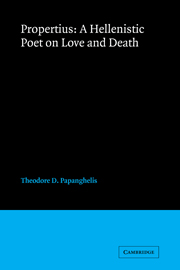Book contents
- Frontmatter
- Contents
- Preface
- Abbreviations
- 1 Introductory
- 2 nostris puer haesit ocellis: the lessons of 1.19
- 3 in amore mori: witches and lovers
- 4 in amore mori: the funeral
- 5 in amore mori: the shipwreck
- 6 in amore mori: crime passionnel
- 7 in amore mori: minor instances in Book 2
- 8 Strange beauty: a reading of 4.7
- 9 Concluding thoughts
- Bibliography
- Indexes
1 - Introductory
Published online by Cambridge University Press: 04 August 2010
- Frontmatter
- Contents
- Preface
- Abbreviations
- 1 Introductory
- 2 nostris puer haesit ocellis: the lessons of 1.19
- 3 in amore mori: witches and lovers
- 4 in amore mori: the funeral
- 5 in amore mori: the shipwreck
- 6 in amore mori: crime passionnel
- 7 in amore mori: minor instances in Book 2
- 8 Strange beauty: a reading of 4.7
- 9 Concluding thoughts
- Bibliography
- Indexes
Summary
To speak of love and death in the same breath is to speak of romantic passion par excellence. Classical antiquity knew such passion – and, as a rule, frowned upon it. Marriages of convenience and other practical considerations would normally take precedence over romance. It was also in a practical spirit that people prodded themselves to timely sensuality in view of death's inevitable onset. The carpe diem mood is as unavoidable as human weakness. Catullus, Propertius and Tibullus shared with their contemporaries a sensitivity to it, but they could also fly in the face of their contemporaries’ conception of love by endorsing, in varying degrees of seriousness, a type of lover consumed by the morbus, intent on the militia and wallowing in the servitium amoris. These are metaphors on which the idea of death will naturally thrive, although not in order to militate against, but rather in order to confirm the idea of love. ‘Love until death’ and ‘death in the service, or because of the hardships of love’ do not mark an antagonism (which lies at the root of the carpe diem mood) so much as a certain rapprochement. Such rapprochement, apt to be accounted a mere cliche of love poetry today, would have struck the contemporary reader of love elegy as part of an idiom that wanted, whether in jest or earnest, to sound unconventional. This idiom Propertius shared with his fellow elegists but in dealing with one of its cardinal topoi, namely, the rapport between elegiac love life and death, he also developed an ‘idiolect’ of his own.
- Type
- Chapter
- Information
- Propertius: A Hellenistic Poet on Love and Death , pp. 1 - 9Publisher: Cambridge University PressPrint publication year: 1987



